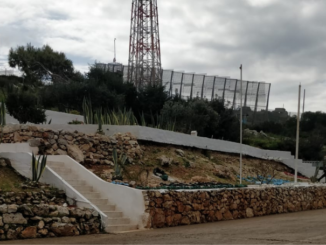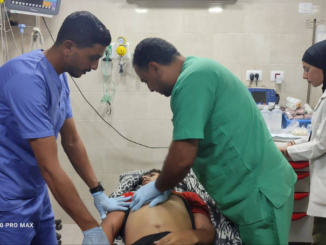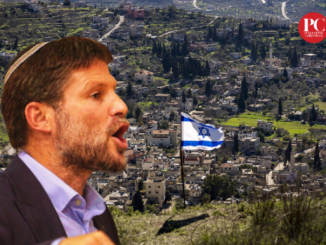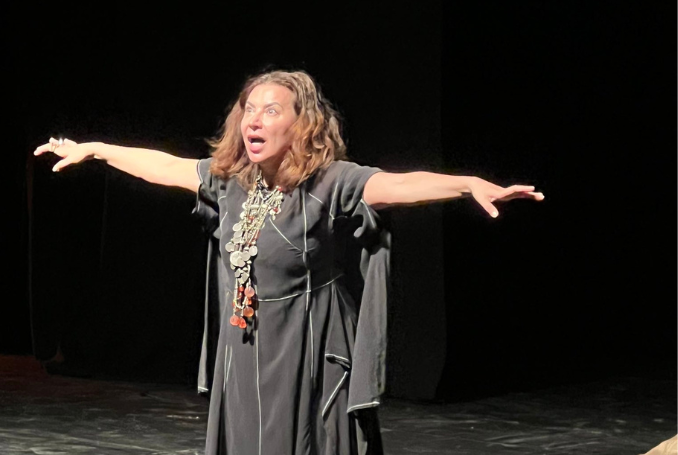
By Ilan Pappe – The Palestine Chronicle 
Raeda Taha is a famous actress who appears on many stages in the Arab world and beyond. Raeda became widely known after she performed her own play, Where Would I Find someone like you, Ali, which tells her and her father’s life story, which also appeared later in a book she wrote under the title, Ali.
Ali is Ali Taha Abu Sninah from Jerusalem (originally a family from al-Khalil, Hebron). Ali commanded the operation of the Sabena airplane hijacking in May 1972 which was landed by the guerrilla fighters in Tel-Aviv. The group hoped to exchange the 90 hostages who boarded the plane in Vienna, with 315 Palestinian political prisoners. Reginald Levy, the Sabena captain, later recalled his last conversation with Ali (whose Nom de Guerre was Captain Kamal Rifat). Levy, the British pilot, heard for the first time the many grievances Palestinians held against Britain for its role in the Nakba. The conversation, however, moved swiftly to more personal matters and focused on the hopes of both men to survive the tough situation that brought them together. “I miss my daughters,” confessed Ali to Levy. The Israeli soldiers burst into the plane and killed Ali and some other members of the unit.
Last month, Raeda performed in front of a 48-Arabs audience in the city of Nazareth. She performed her play, The Fig Tree, Shajrat al-Tin, in the cinematheque in the city. This hall is quite a unique venue within Israel. Its managers try to preserve the Arab and Palestinian heritage in almost impossible economic, political and social realities. Through performances such as Raeda’s, this dark reality is illuminated and brushed aside, be it for short while. Performances, such as the one Raeda gave in front of a hall full of local Palestinians, enable them to reconnect to their roots and reassert their collective identity. That moment, when the people of Nazareth met Raeda on the stage, reminded us that Nazareth is located not only in Israel but also in Palestine and is part of Bilad al-Sham, the Greater Syria area.
Israel, ever since 1948, tried to de-Arabize and de-Palestinize Nazareth; its leaders expect the gratitude of the people there for being spared from the massive 1948 ethnic cleansing and, therefore, fortunate enough to be guided into modernity by Israel. But the reality is very different. Nazareth’s fate is not different from the towns of the West Bank that were left intact during the 1948 Nakba, and not very different from Raeda’s hometown, Jerusalem – all are Palestinian cities that, while not depopulated in the Nakba, are still under Israeli apartheid and occupation.
I have known Raeda for many years, but this was the first time I saw her on stage. The monodrama she displayed on the stage in Nazareth is a charged, moving and, at times, a funny journey from pre-1967 Jerusalem and the return to it in 1994.
Ali, her father, appears in the play mainly in an imagined meeting after Raeda’s return, many years after he was killed by the Israelis. A thinker, a man of culture and poetry, who had boundless love for Jerusalem and who chose to be a freedom fighter and became a martyr because of this choice; like so many of his contemporaries who preferred a trajectory that led them to their death instead of a professional career and a life of certainty and self-fulfillment.
Raeda was eight when her father was killed. She spent her childhood in Beirut but, in the play, she re-lives the childhood she could have had in Jerusalem in the house of the maternal grandfather who arrived from Afghanistan. In the 19thcentury, Afghani pilgrims decided to stay in Jerusalem and built a Zawiyya, a Sufi order, in Wadi Amud. Her grandfather’s home is still there and, in the yard, there are four trees that are reincarnated on the stage, alongside Raeda – alternating between full blossom and gloomy bareness; it depends on the story Raeda chooses to tell us. On one of the trees, a bride climbed seeking asylum from new married life and, around it, the women of the house sat and gossiped in good and bad times –experiencing a normal life that was taken away from all of them in 1948 in many places in the homeland, and in 1967 in eastern Jerusalem.
Raeda mimics her Afghani grandfather and some people from the audience ask – as a Palestinian theatre is always interactive – “What language is it?” and, without losing her hand of the play’s pulse, Raeda explains that this is Urdu, and returns to the text. She stops when she notices that some youngsters are not fully focused on the play. “Come be with us,” she says and, without hesitation, returns to the monologue. In this monologue, she plays old and young women, a hundred-year-old man, and a young teenager. She moves from a Khalili dialect to a Ghazawi one and back to an al-Qudsi one. With all my command of the Arabic language, I feel a bit lost, but manage to follow the plot (needless to say, I was the only Jew in the audience). I even knew one of the characters she mimics, Arafat’s Head of Chamber, who comes to tell Raeda about the Chairman’s ideas for Raedas’s wedding in Tunis. It will include, she is told, the anthem, Mawtini – she scolds the visitor, “This is not our anthem; our anthem is Fia’i” and she stands erect and begins to sing it, and the audience joins her singing the long forgotten anthem of the liberation movement.
In between 1987 and 1994, Raeda was the PLO Press Secretary in Tunis. It is here that she married Suhail who, alas, has passed away since then. This was at the time that I visited Arafat in Tunis, and political weddings such as the one between Fawzi Nimr and Fatama Barnawi, ignited the Palestinian imagination but did not always correspond to the personal love stories or the real romances on the ground. Raeda refused to be staged in a revolutionary style and clarified to Arafat’s Head of Chamber that she wanted a normal wedding; not in the Al-Quds school, as suggested by the Chairman, but in a hotel. If al-Quds she said, then only in the real al-Quds.
“My wedding is not part of the Fatah maharjan [public display],” she declared on the stage. And so, the wedding takes place in a hotel and Arafat, being Arafat, makes a dramatic entry, and no one can mimic that moment better than Raeda – I was glad I could join the audience in healthy laughter! Humor has been also weaponized by the Palestinians’ struggle for survival. And, in every humorous moment, there is a personal moment of sorrow and grief: Raeda describes how she collapsed into Arafat’s hands and pleaded: “I want to return to you, I do not want to get married!”
More than anything else, this play fuses personal liberation with the national one and they are indissoluble. This is why it is such a powerful statement about return, and its meaning. Raeda executes the right of return, in a way, when she returned with her husband to Jerusalem in 1994. On the journey back, she enquires about her grandfather’s house and finds out that, in the Wadi Amud neighborhood, everyone knows her father, but they did not know her. And, thus, she finds herself in front of the house. From that moment, we do not know if she tells us what she saw, or what she hoped to see. Her father is there in her imagination, flying with her over Jerusalem, pointing to the Abu Shuqri Humus joint, appropriated since by Israelis, the al-Aqsa Mosque, the Holy Sepulcher and, on the way, he enumerates hurriedly the names of all the gates of the Old City he was forced to leave in 1967.
Suddenly, a polite voice grounds her back to the bitter reality of the empty house and to the once majestic trees that now look miserable. This is the voice of Awni, a teenager, who she suspects of squatting in her grandfather’s house. “Would you like tea with marmieh?” he asks gently, and is immediately scolded for being the usurper who cut a pleasant imaginary flight over the city. But he is not; this is her cousin, and maybe this is a return when Raeda unites with the next generation in the family house in Jerusalem.
The return is, thus, bitter-sweet, as are Raeda’s memories and, like her life, they are a humorous tale intertwined with sorrow and unimaginable horror. We hear about the way the Israeli secret service tortured one of the family’s women who was caught smuggling weapons over the River Jordan Bridge. “An hour they drowned her in cold water; an hour they drowned her in hot water … soldiers walked over her belly and she was paraded in front of both watching soldiers and her husband, who was forced to look at the soldiers gazing at her … and she did not break” [namely, she did disclose who sent her] … She was jailed with Jewish criminal prisoners who abused her but she did not break …” In the end, she went on a hunger strike and was expelled to Jordan.
The return is, thus, parallel trips in time that get entangled in each other. This is a nostalgic journey that takes place first, in a dream in a Jerusalem that was and was not, and maybe will not be the same. Before her arrival, Raeda tries to assess how much land the family had and tries to remain realistic about it. As she jokes in the play, according to some Palestinian recollections, they owned so much land that Palestine must have been as spacious as Australia!
It is a different journey in reality. Time is not frozen, and many people in her life have already disappeared, and the landscape is totally altered, as are the politics of the place. The play does not relate too much to the political reality at the time of Raeda’s return. A Palestinian audience does not need such a political contextualization and the great quality of this play is that it is not a political pamphlet – it is a testimony of the impact the tragic history had on Palestinians, as much as it is a tale of the unbelievable resilience and resistance shown by Palestinians such as Raeda, who did not allow the traumatic events to define her or leave her as a helpless victim. Her very appearance on the stage is the antidote of agency in the face of trauma and tragedy caused by the criminal policies of Zionism and Israel.
It is not easy to be the daughter of a shahid and to spend time in Ramallah, Beirut and all over the world. Raeda took the play to the refugee camps in Lebanon and other parts of the Palestinian Diaspora and there, as in Nazareth, the audience gave her a long-standing ovation. What makes a Palestinian audience react so strongly to such a play? It seems that Radia’s humanity, and that of her life story, grants a realistic dimension to the act of return that all the Palestinians want to exercise but find themselves against the Zionist and Israeli rejectionist policy of denial, racism and settler colonialism.
Without the full implementation of the Right of Return, there is no point in discussing reconciliation or the much-abused term, “peace”, in historical Palestine. This is not just a political return: this is part of a Palestinian vision of liberation and self-determination. It is a demand anchored in international law that should allow every Palestinian to return to their fig trees and to the normal life conducted under such trees, to love – which is not political, to relay a tradition that sometimes strangulates and, at times, offers a warm embrace. To life liberated from occupation and oppression and from the constant need to fight against them – because if you do not fight, you do not survive.
I hope many people will see the play and understand the sacredness of the Right of Return, the justified struggle for liberation and the essentiality of both in any attempt for reconciliation in the torn land of Palestine.
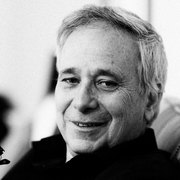
– Ilan Pappé is a professor at the University of Exeter. He was formerly a senior lecturer in political science at the University of Haifa. He is the author of The Ethnic Cleansing of Palestine, The Modern Middle East, A History of Modern Palestine: One Land, Two Peoples, and Ten Myths about Israel. He is the co-editor, with Ramzy Baroud of ‘Our Vision for Liberation.’ Pappé is described as one of Israel’s ‘New Historians’ who, since the release of pertinent British and Israeli government documents in the early 1980s, have been rewriting the history of Israel’s creation in 1948. He contributed this article to The Palestine Chronicle.

